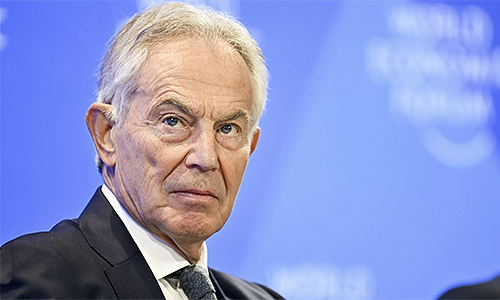Decolonisation in the 20th Century wasn’t always a great success. Over a million people were slaughtered in communal violence when India and Pakistan finally became independent nations in 1947. Nigeria became independent in 1960 and, six years later, a civil war commenced in which as many as 2 million citizens were killed or starved to death. Most of Britain’s other former colonies had an equally shaky start and the other European colonial powers made a similarly disastrous hash of the process of decolonisation. Today, in the humanities departments of universities throughout the Western world, almost everyone agrees that the widespread chaos in Africa and Asia following decolonisation was the fault of the European colonisers.
Edward Said, who for almost 40 years taught at Columbia University, was a leading exponent of the ‘it’s all the fault of the white man’ school of thought. His books Orientalism and Culture and Imperialism argue that a white supremacist ideology was established by Europeans to justify taking over most of what became known as the ‘third world’. In Culture and Imperialism he says, ‘Almost all colonial schemes begin with an assumption of native backwardness and general inadequacy to be independent.’ According to Said, the imperialist ideology which justified Europeans taking control of Africa and the Middle East was supported by almost every major 18th and 19th Century British writer. Defoe, Jane Austen, Dickens, Disraeli, Kipling and, inevitably, Joseph Conrad were all accused of either supporting or failing to condemn the prevalent racist ideology. Both those books remain, to this day, widely read and influential in universities across the globe and are a major source of the anti-Semitism so prevalent in our ‘centres of learning’.
Said’s views were strongly influenced by the French structuralists such as Foucault but, unlike that gang of wordy obscurantists, his writing is characterised by elegance and erudition. Admirable as those qualities are, they do not guarantee the truth of an intellectual position and Said’s work has been characterised as an ‘incoherent amalgam of dubious postmodern theory, sentimental Third Worldism, glaring historical errors, and Western guilt’ and as ‘the academic equivalent of radioactive waste’.
But while the merits of Said’s work is a matter of considerable debate, his influence on academics is undeniable.
According to a 2005 search on the utility ‘Syllabus Finder’, Said’s books were assigned as reading in 868 courses in American colleges and universities (counting only courses whose syllabi were available online). These ranged across literary criticism, politics, anthropology, Middle East studies, and other disciplines including postcolonial studies, a field widely credited with having grown out of Said’s work. More than 40 books have been published about him, including even a few critical ones, but mostly adulatory. (Joshua Muravchik, The False Scholarship of Edward Said.)
Australia’s tertiary education system is no more immune from his (malign?) influence than anywhere else in the Western world’s universities. In 2018, Sydney University held a substantial seminar with scholars from around the world attending to ‘celebrate 40 years of Orientalism’ at which one academic, echoing the ideas of Said, argued that ‘the idea of Western Civilisation, which has little material or empirical validity as an identity, has had incredible discursive and ideological power to shape an identity of chauvinist superiority and racist, damaging policies both towards minorities at home and societies abroad’.
I’m not sure that Said would subscribe to the idea that Western Civilisation is a concept with no ‘empirical validity’ but the fact that his arguments continue to be used and amplified by other academics is another indication of his importance in the academic world.
Said’s importance in academia, in a curious way, resembles that of our own great local scholar Bruce Pascoe whose magnum opus Dark Emu has had an unparalleled success despite the mediocrity of its contents. Just as scholars such as Bernard Lewis, whose understanding of the history and richness of Arabic culture was much greater than that of Said but whose work never achieved the success of Said, so Australian scholars such as Professor Peter Sutton (whose involvement with Aboriginal groups was much deeper than that of Pascoe), never achieved the same degree of recognition for his work. Bernard Lewis was fluent in several Middle Eastern ancient and modern languages, while Said’s only language from that part of the world was modern Arabic and his command of that language apparently wasn’t that great. In the same way, Sutton, who has lived in Aboriginal communities and learned their languages, has nowhere near the level of recognition from the general public that he deserves.
The current global wave of anti-Semitism raises the question as to the extent to which Said’s work has influenced the movement. His work has provided a powerful intellectual legitimacy for left-wing anti-Israel activists in the academic world.
The steady rise of left-wing influence in the humanities departments on campuses throughout the West has many causes. The Vietnam War, the disastrous consequences of Bush’s decision to topple Saddam Hussein, the botched withdrawal from Afghanistan are some of the events which have created a dismal, self-loathing element in Western culture. Said’s role in the rise of anti-Semitism is complex.
Along with Daniel Barenboim, Said founded the West–Eastern Divan Orchestra whose aim was to promote harmony between opposing groups in the Middle East. Perhaps the best that can be said is that his support for the Palestinian cause has been misused by the radical left. There are many scholars who would argue that this is too kind to a brilliant but deeply flawed scholar.









